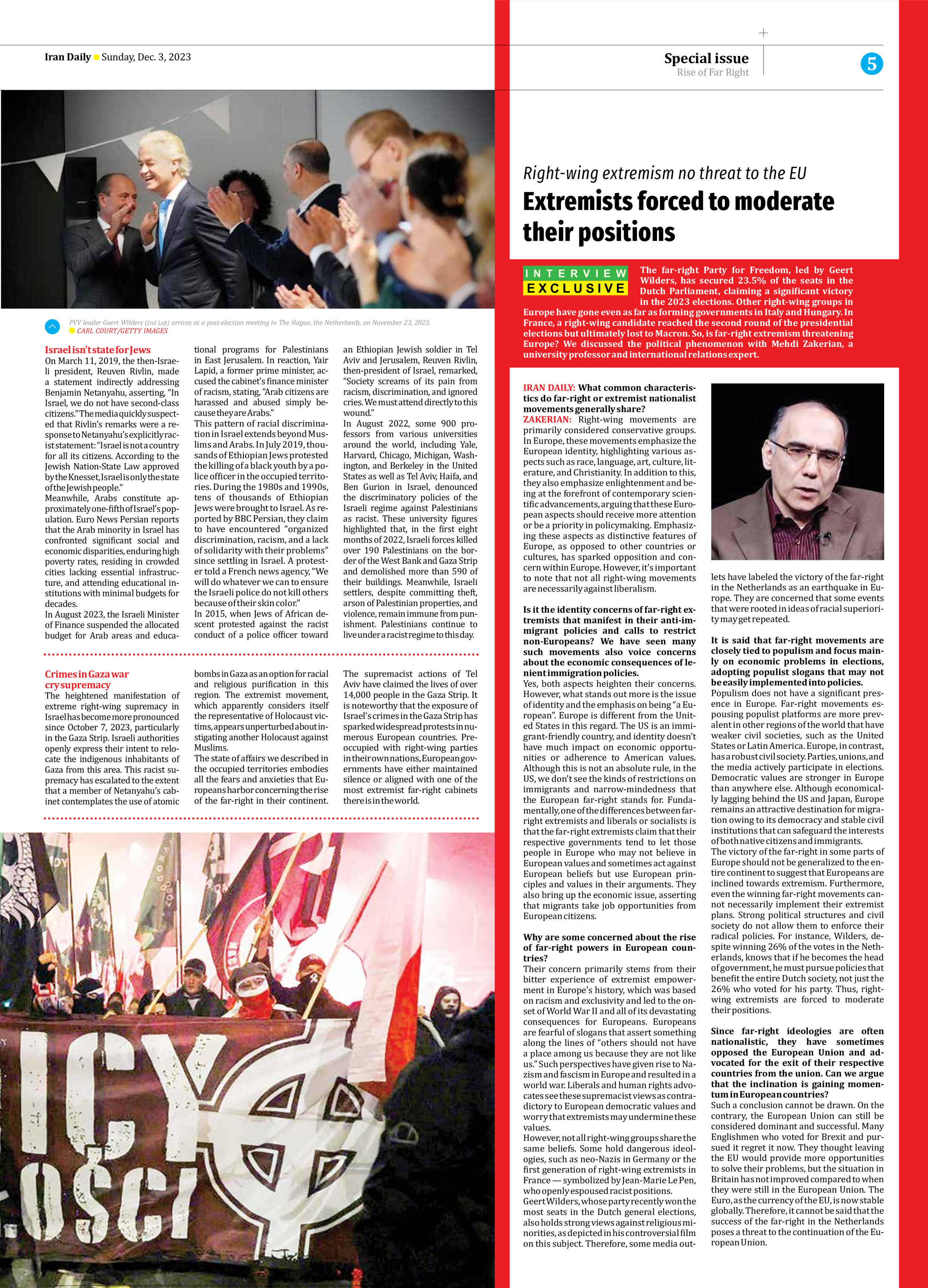
Right-wing extremism no threat to the EU
Extremists forced to moderate their positions
The far-right Party for Freedom, led by Geert Wilders, has secured 23.5% of the seats in the Dutch Parliament, claiming a significant victory in the 2023 elections. Other right-wing groups in Europe have gone even as far as forming governments in Italy and Hungary. In France, a right-wing candidate reached the second round of the presidential elections but ultimately lost to Macron. So, is far-right extremism threatening Europe? We discussed the political phenomenon with Mehdi Zakerian, a university professor and international relations expert.
IRAN DAILY: What common characteristics do far-right or extremist nationalist movements generally share?
ZAKERIAN: Right-wing movements are primarily considered conservative groups. In Europe, these movements emphasize the European identity, highlighting various aspects such as race, language, art, culture, literature, and Christianity. In addition to this, they also emphasize enlightenment and being at the forefront of contemporary scientific advancements, arguing that these European aspects should receive more attention or be a priority in policymaking. Emphasizing these aspects as distinctive features of Europe, as opposed to other countries or cultures, has sparked opposition and concern within Europe. However, it’s important to note that not all right-wing movements are necessarily against liberalism.
Is it the identity concerns of far-right extremists that manifest in their anti-immigrant policies and calls to restrict non-Europeans? We have seen many such movements also voice concerns about the economic consequences of lenient immigration policies.
Yes, both aspects heighten their concerns. However, what stands out more is the issue of identity and the emphasis on being “a European”. Europe is different from the United States in this regard. The US is an immigrant-friendly country, and identity doesn’t have much impact on economic opportunities or adherence to American values. Although this is not an absolute rule, in the US, we don’t see the kinds of restrictions on immigrants and narrow-mindedness that the European far-right stands for. Fundamentally, one of the differences between far-right extremists and liberals or socialists is that the far-right extremists claim that their respective governments tend to let those people in Europe who may not believe in European values and sometimes act against European beliefs but use European principles and values in their arguments. They also bring up the economic issue, asserting that migrants take job opportunities from European citizens.
Why are some concerned about the rise of far-right powers in European countries?
Their concern primarily stems from their bitter experience of extremist empowerment in Europe’s history, which was based on racism and exclusivity and led to the onset of World War II and all of its devastating consequences for Europeans. Europeans are fearful of slogans that assert something along the lines of “others should not have a place among us because they are not like us.” Such perspectives have given rise to Nazism and fascism in Europe and resulted in a world war. Liberals and human rights advocates see these supremacist views as contradictory to European democratic values and worry that extremists may undermine these values.
However, not all right-wing groups share the same beliefs. Some hold dangerous ideologies, such as neo-Nazis in Germany or the first generation of right-wing extremists in France — symbolized by Jean-Marie Le Pen, who openly espoused racist positions.
Geert Wilders, whose party recently won the most seats in the Dutch general elections, also holds strong views against religious minorities, as depicted in his controversial film on this subject. Therefore, some media outlets have labeled the victory of the far-right in the Netherlands as an earthquake in Europe. They are concerned that some events that were rooted in ideas of racial superiority may get repeated.
It is said that far-right movements are closely tied to populism and focus mainly on economic problems in elections, adopting populist slogans that may not be easily implemented into policies.
Populism does not have a significant presence in Europe. Far-right movements espousing populist platforms are more prevalent in other regions of the world that have weaker civil societies, such as the United States or Latin America. Europe, in contrast, has a robust civil society. Parties, unions, and the media actively participate in elections. Democratic values are stronger in Europe than anywhere else. Although economically lagging behind the US and Japan, Europe remains an attractive destination for migration owing to its democracy and stable civil institutions that can safeguard the interests of both native citizens and immigrants.
The victory of the far-right in some parts of Europe should not be generalized to the entire continent to suggest that Europeans are inclined towards extremism. Furthermore, even the winning far-right movements cannot necessarily implement their extremist plans. Strong political structures and civil society do not allow them to enforce their radical policies. For instance, Wilders, despite winning 26% of the votes in the Netherlands, knows that if he becomes the head of government, he must pursue policies that benefit the entire Dutch society, not just the 26% who voted for his party. Thus, right-wing extremists are forced to moderate their positions.
Since far-right ideologies are often nationalistic, they have sometimes opposed the European Union and advocated for the exit of their respective countries from the union. Can we argue that the inclination is gaining momentum in European countries?
Such a conclusion cannot be drawn. On the contrary, the European Union can still be considered dominant and successful. Many Englishmen who voted for Brexit and pursued it regret it now. They thought leaving the EU would provide more opportunities to solve their problems, but the situation in Britain has not improved compared to when they were still in the European Union. The Euro, as the currency of the EU, is now stable globally. Therefore, it cannot be said that the success of the far-right in the Netherlands poses a threat to the continuation of the European Union.







